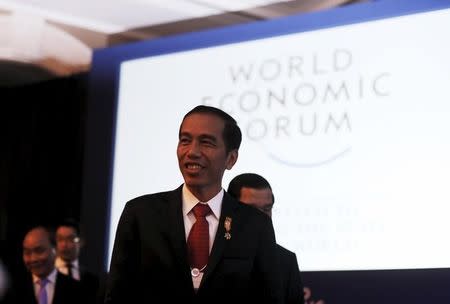Indonesia's Widodo seeks to tame bureaucrats blocking infrastructure drive

By Nicholas Owen JAKARTA (Reuters) - Frustrated with his bureaucrats over delays to road and port building projects crucial to reviving the economy, Indonesia's president is pushing for a new, faster selection process to find officials who can deliver on time. With economic growth at its slowest in nearly six years and his popularity ebbing, Joko Widodo is considering sidelining civil service panels set up to pick the most capable candidates for top jobs. Widodo took office last October with the reputation of a reformer in a country consistently ranked among the world's most corrupt by watchdog Transparency International, but risks tainting that image by appearing to backtrack on a reform move. However, staffing delays and ministerial meddling with the selection panels that take 10 times longer than the old system, itself criticised as being patronage-driven, have made it tough to launch projects, fuelling the impatience of investors. "The president was thinking out loud, with some of the cabinet, whether he should put on hold temporarily all the selection schemes for public officials," one senior official at the presidential palace told Reuters, echoing Widodo's understated style of giving orders. It was not immediately clear what alternative Widodo will follow. But the comment reflects his frustration that public officials did not live up to his expectations, added the official, who declined to be identified because of the sensitivity of the subject. Widodo wants to spend about $20 billion this year on new ports, roads and other projects, but the bureaucracy has so far disbursed only around a tenth of the capital spending budget. A revival in infrastructure projects would boost growth in southeast Asia's largest economy from a first-quarter figure of 4.7 percent to around the 6 to 7 percent rate analysts estimate is needed to ensure jobs for those entering the workforce. Still, sidelining the panels could be a risky move. "That would send a very ambivalent message about clean governance reform," said consultant Kevin O'Rourke, who advises investors on political risks in Indonesia. Widodo remains committed to governance reform, however, said his chief of staff, Luhut Panjaitan. "The president really wants to discipline the bureaucracy," he told reporters. He said he did not know of plans to revamp the selection panels, although the administration was looking into their functioning. TAKE THE POLITICS OUT OF APPOINTMENTS The selection panels, used by every ministry and about 100 local government bodies, were meant to take the politics out of civil service appointments, giving more weight to merit. Sidelining them might make it simpler to fill long-vacant posts with officials who can sign off on spending decisions. But Yuddy Chrisnandi, the minister handling administrative and bureaucratic reform, has faced criticism for staffing panels with people loyal to him. "This is an example of how bureaucratic reform cannot make headway with patronage-motivated figures as ministers," said O'Rourke. Simply filling vacant posts will not resolve the spending snarls if the civil service itself is left unreformed. Indonesia's civil service of 4.6 million is still structured along military lines adopted in the 1960s by late strongman Suharto and has a culture of following orders, rather than independent thinking. Coupled with new caution in the face of scrutiny by anti-corruption authorities, this means that billions of dollars are not being spent when the economy needs them most. "Civil servants won't sign anything," said the palace official. Conditions for civil servants have changed from the Suharto era, when they had to be members of the ruling party and could expect promotion in return for loyalty, but some habits persist. Widodo wants to cut to three weeks the time the panels take for appointments, said Sofian Effendi, chief of the civil service commission. They need about 10 weeks, versus just one, under the old seniority-based system, he added. "The new system has not been perfect," he said. "But having the highest rank doesn't mean the candidate is the most suitable." (Additional reporting by Gayatri Suroyo, Kanupriya Kapoor and Klara Virencia; Editing by Clarence Fernandez and Simon Webb)
